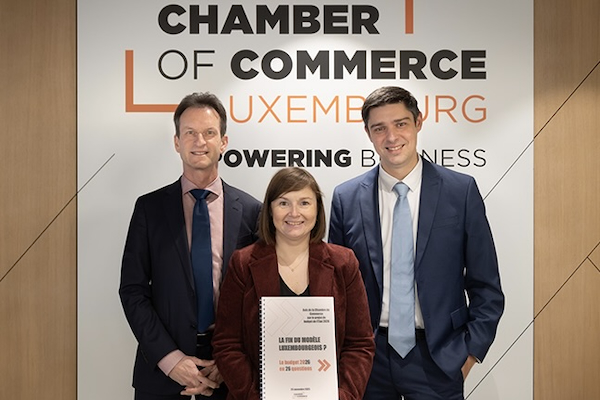 (L-R) Carlo Thelen, Director General of the Chamber of Commerce; Christel Chatelain, Director of Economic Affairs; Anthony Villeneuve, Senior Economist;
Credit: Laurent Antonelli, Blitz
(L-R) Carlo Thelen, Director General of the Chamber of Commerce; Christel Chatelain, Director of Economic Affairs; Anthony Villeneuve, Senior Economist;
Credit: Laurent Antonelli, Blitz
On Tuesday 25 November 2025, the Luxembourg Chamber of Commerce presented its opinion on the draft state budget for 2026 and the multi-year financial programme for 2025–2029.
In a press release, the Chamber of Commerce warned of an increasingly fragile budgetary trajectory in the face of a persistent economic slowdown. In its opinion on the 2025–2029 budget it cautioned against a lasting imbalance between the growth of public expenditure - now exceeding 48% of GDP - and that of the real economy.
As the size of the State continues to grow faster than national wealth, in a context marked by demographic, technological and environmental challenges, the Chamber called for a restoration of credible budgetary discipline, based on a rigorous prioritisation of public spending, in order to preserve the sustainability of the country’s finances.
It added that in an international context characterised by economic fatigue, rising geopolitical tensions and a prolonged climate of uncertainty, Luxembourg’s growth is slowing while public expenditure continues to increase at a sustained pace. The Chamber highlighted that the gap between the growth of the real economy and public spending had now reached a “worrying and record level”. In 2026, public expenditure is projected to reach €45.5 billion, an increase of 5.6% compared with 2025, a pace exceeding economic growth.
According to the Chamber of Commerce, as a proportion of GDP, public administration spending now represented more than 48%, an “unprecedented level, never reached even at the peak of the health crisis”. This ratio was only 38% in 2000 and 42% in 2010. It also noted that recruitment by the State also continues at a rapid pace.
“Luxembourg faces a concerning structural imbalance: spending is increasing much faster than national wealth,” said Carlo Thelen, Director General of the Chamber of Commerce. “This situation cannot persist without compromising our financial credibility and AAA rating. If we want to preserve our long-term capacity for action, we must urgently restore credible budgetary discipline and act on our rigid expenditures.”
Despite the growth slowdown affecting the country, the size of the State continues to expand, driven by increases in the public wage bill - €347 million in 2026 - and the constant addition of new public policies without clear prioritisation.
Christel Chatelain, Director of Economic Affairs, emphasised the urgency of change: “Luxembourg must change its budgetary culture. We need to move from a logic of accumulation to one of prioritisation. Every euro spent must be justified by its effectiveness and measurable impact on competitiveness, growth or social cohesion. Only in this way can we restore confidence and preserve the sustainability of public finances.”
Economically, the 2026 budget marks a political turning point: competitiveness remains a central objective, but it is now accompanied by a firm commitment to preserving social cohesion. Carlo Thelen added: “Supporting household purchasing power and social cohesion is legitimate and healthy, but it cannot be at the expense of competitiveness and productivity. Tomorrow’s prosperity will depend on our ability to create value and attract talent and investment.”
The Chamber of Commerce noted that the Luxembourg model is under growing pressure. Social benefits now account for more than 41% of public expenditure, a share that will rise to 42.6% by 2029 due to an ageing population. While the recent adjustment to pension system funding within the framework of the “Sozialronn” gains a few years, the underlying trend remains unfavourable: spending related to ageing is expected to increase by more than ten percentage points of GDP by 2070, the highest growth rate in the European Union. Without policy changes, health and dependency sectors will face growing deficits from 2026, requiring additional public transfers. The Chamber called for urgent awareness of the budgetary consequences of population ageing.
In public investment, the Chamber welcomed efforts to support the technological transition through ambitious investment in research, innovation and artificial intelligence. Funding for the Innovation Fund is set to increase by 52%, reflecting a proactive approach to future technologies. Similarly, significant resources are allocated to the energy transition. These choices are positive but require rigorous oversight and systematic evaluation of their impact on productivity and potential growth.
More broadly, while the Government demonstrated ambition in investment, the Chamber observed that execution of budgetary commitments remained a weakness: delays and gaps between approved credits and actual expenditure persist, particularly in housing and major infrastructure projects. It therefore called for strengthened planning, simplification of administrative procedures and better cooperation with the private sector to improve the economic and social return on investment.
In conclusion, the Chamber of Commerce considered that Luxembourg’s budgetary sustainability will depend on its ability to address three major structural challenges: demographic ageing, stagnating productivity and the restoration of credible budgetary discipline. Fiscal room for manoeuvre still exists but is rapidly shrinking due to rigid spending, volatile and non-permanent revenues, weakened growth and gradually increasing debt, projected to reach 27% of GDP in 2026.
Moreover, the Chamber noted that the multi-year financial projections presented in the budget project omit two particularly costly political commitments: the individualisation of taxation (estimated at €800–900 million per year) and the planned increase in Defence expenditure to 3.5% of GNI by 2035.
“Luxembourg cannot sustainably finance its social model on past prosperity alone, given the immense challenges ahead. It must return to a culture of efficiency to safeguard both collective well-being, financial stability and international credibility,” concluded Christel Chatelain.








